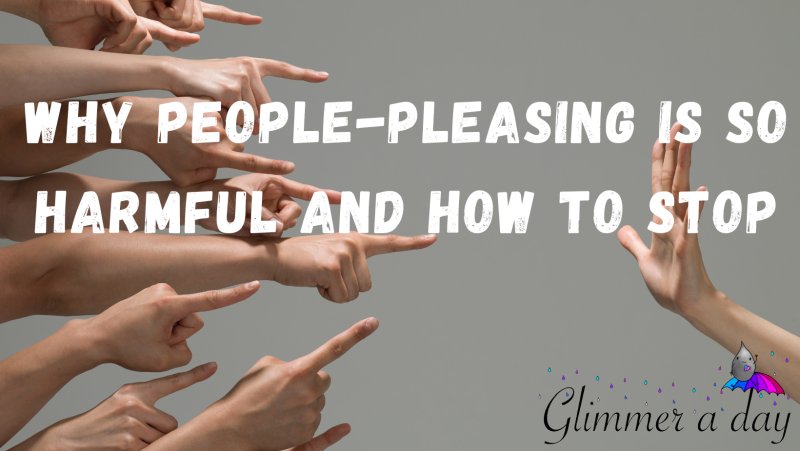Why People-Pleasing is so Harmful and How to Stop

What is People Pleasing?
In a world that is driven by social connections and relationships, being a people-pleaser can be a common problem for many of us. From a young age, children, especially females, are taught to be considerate, empathetic, and accommodating towards others. While these qualities are undoubtedly virtuous, there is a fine line between genuine kindness and the potentially detrimental habit of people-pleasing.
According to Medical News Today:
“People pleaser is not a medical term, so there is no clinical definition for what it means. Generally, it describes a person who consistently strives to please others, often sacrificing their own wants or needs in the process.”
Why Do We People Please?
People-pleasing, at its core, involves a deep-seated desire to gain approval and acceptance from others. It’s about going the extra mile to ensure everyone around us is content and happy, often at the expense of our own needs and desires. The origins of this behaviour can be rooted in childhood experiences, societal expectations, and a fear of rejection. It can be due to low self-esteem and people-pleasing will provide the external validation that would give them the approval and acceptance they desire. It can also be a trauma response, read more about ‘fawning’ here.
On the outside a people pleaser may appear…
- Understanding
- Reliable
- Polite
- Loyal
- Organised
- Helpful
- Attentive
- Caring
- Motivated
…but on the inside people pleasers feel very different:
- Anxious
- Low self-worth
- Self-critical
- Resentful
- Lonely
- Seeks validation
- Lost
- Disconnected
- Negative Self-image
- Burnout
The Paradox of Pleasing
While people-pleasing may seem harmless or even admirable on the surface, it can quickly evolve into a self-defeating pattern. Constantly prioritising the needs of others over our own can lead to feelings of resentment, anxiety, and burnout. Additionally, people-pleasers often attract individuals who exploit our willingness to accommodate, inadvertently perpetuating unhealthy or one-side relationships which of course eventually breeds resentment…
The toll on on our mental and physical health:
- Emotional Exhaustion: Regularly suppressing our own feelings and desires to appease others can drain our emotional resources. The accumulation of unexpressed emotions can lead to emotional exhaustion, contributing to a cycle of frustration and unhappiness.
- Diminished Self-Worth: Relying on external validation for our self-worth can be detrimental. People-pleasers often base their self-esteem on the approval of others, making them vulnerable to feelings of inadequacy if the validation is not forthcoming.
- Neglected Goals: Constantly prioritizing others’ needs might mean setting aside our own aspirations and goals. Over time, this neglect can lead to regrets and unfulfilled potential.
- Strained Relationships: Paradoxically, people-pleasing can strain relationships. The lack of authenticity and open communication can create barriers between individuals, hindering genuine connections.
Breaking free from the cycle of people-pleasing:
- Self-Awareness: Recognize the patterns of people-pleasing in your behaviour. Understand the triggers that lead you to prioritise others over yourself.
- Set Boundaries: Learn to establish healthy boundaries in your relationships. Communicate your limits and needs clearly, ensuring that your own well-being is a priority.
- Practice Self-Compassion: Cultivate self-compassion by treating yourself with the same kindness you extend to others. Acknowledge that your needs and feelings are valid.
- Learn to Say No: Understand that saying “no” doesn’t equate to being selfish. Prioritise your own commitments and well-being when making decisions.
- Seek Support: Consider talking to a therapist or counsellor to delve into the roots of your people-pleasing tendencies and develop healthier coping strategies.
You will always be a kind compassionate person
You can still be a kind, helpful person but by having firm boundaries and self-worth, you are extending the kindness to your self. By breaking the cycle of people-pleasing you will become more authentic, getting to know the real you. That your needs, wants and opinions matters, and that you actually have some pretty interesting perspectives to share with others which you mightn’t have shared before in your more ‘agreeable’ days.
Losing your people-pleasing habits and finding the Glimmers.
Are you a people-pleaser? Remember it takes time, courage and determination to change habits of a lifetime and overcome the feelings of guilt that will inevitably surface when you begin to make changes. When you start to value yourself, you will likely lose the ‘takers’ in your life who benefited most from your people- pleasing ways. Take the opportunity to notice who are the ‘keepers’ in your life, those who encourage you to be authentically you, those who are interested in,appreciate and will go the extra mile for you. Keep your circle small and worthy and as always- look for your glimmers.
